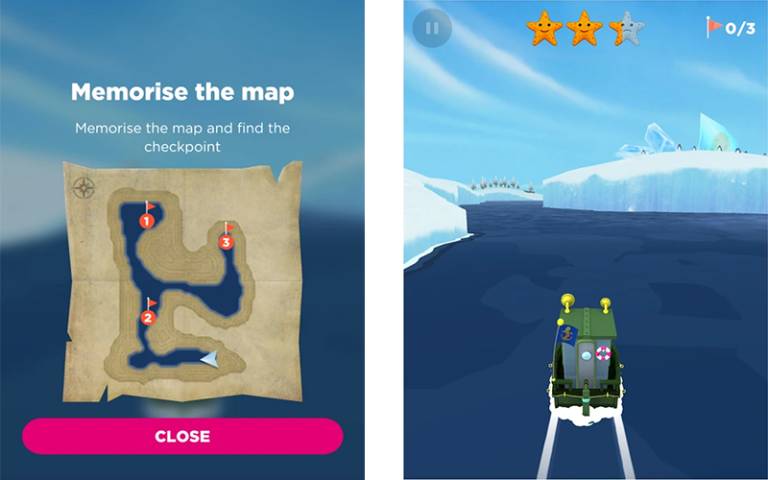Left-handers aren’t better spatially, gaming research shows
14 November 2023
Left-handedness is not linked to better spatial skills, despite some previous evidence of a performance gap, according to a large international study led by UCL and University of York researchers.

The research, published in Proceedings of the Royal Society B, also sheds light on how left-handedness varies by country, with the highest rates in the Netherlands and lowest in China.
The study involved 422,772 people from 41 countries who were playing a mobile game designed for neuroscience research, called Sea Hero Quest, which tests wayfinding abilities using a task where game players navigate a boat through a virtual environment to find checkpoints shown on a map.
As participants had submitted demographic data including hand preference, the researchers were able to find that left handers were neither better nor worse than right handers at the tasks, clarifying a long-running debate about links between handedness and spatial skills.
Potential cognitive differences based on handedness can stem from how the brain has two hemispheres, controlling the opposite sides of the body, so in right handers, the left hemisphere controls the dominant right hand, whereas the situation is reversed in left-handers. Many cognitive abilities are also dominated by one of the two brain hemispheres, while right and left handers also show different patterns of lateralisation – the specialisation of a particular area.
Spatial cognition, the ability of humans to perceive and navigate our physical environment, is a fundamental set of brain-based skills. It is also not clearly dominated by either hemisphere, leaving scientists unclear as to whether it has any link to handedness.
Some, inconclusive, research has suggested that left-handers might be better at navigating virtual and real games, and left-handed athletes are known to be over-represented in some professional sports, but as handedness patterns differ between cultures, it can be difficult to research.
Co-lead author Professor Hugo Spiers (UCL Psychology & Language Sciences) explained: “Thanks to the massive dataset of the Sea Hero Quest study that brings together participants from around the world, we were able to pick apart cultural differences in handedness. We also found additional evidence for how in some countries, rates of left-handedness are much lower than the international average, driven perhaps by historical trends in some areas to teach everyone to use the same hand.”
Left handers in the sample made up an average of 9.94% of the participants, with more males using their left hand compared with women, similar to what had previously been found. The highest rate was found in the Netherlands, at 12.95%, while China had the lowest at 2.64%, followed by Indonesia (3.39%) and Vietnam (4.26%).
Co-lead author Dr Pablo Fernandez-Velasco (University of York) said: “Recruiting participants in our study through a video game is a new approach, which allowed us to standardise a test across a very large sample. We found no reliable evidence for any difference in spatial ability between left and right handers, across all countries. Moreover, that large data sample allowed us to confirm that factors like age, gender and education don’t play a part in the relationship between hand preference and spatial ability.
“We’re still finding out so much about cognition, and although we’ve shown that large-scale spatial skills aren’t affected by left and right handedness, perhaps further research will find some differences based on handedness when it comes to navigation styles, or to preferences for different types of environments.”
The study was supported by Deutsche Telekom, Alzheimer’s Research UK, and the Leverhulme Trust, while Sea Hero Quest, designed to contribute to dementia research, was produced by Glitchers.
Links
- Research paper in Proceedings of the Royal Society B: Biological Sciences
- Professor Hugo Spiers' academic profile
- UCL Psychology & Language Sciences
- Sea Hero Quest
- Previous Sea Hero Quest research: Nordic nations, North Americans and Antipodeans rank top in navigation skills
- Previous Sea Hero Quest research: Male stereotypes drive some countries to overestimate navigation ability
Image
- Screenshots taken from Sea Hero Quest (Credit: Deutsche Telekom AG)
Media contact
Chris Lane
tel: +44 20 7679 9222 / +44 (0)7717 728 648
E: chris.lane [at] ucl.ac.uk
 Close
Close

